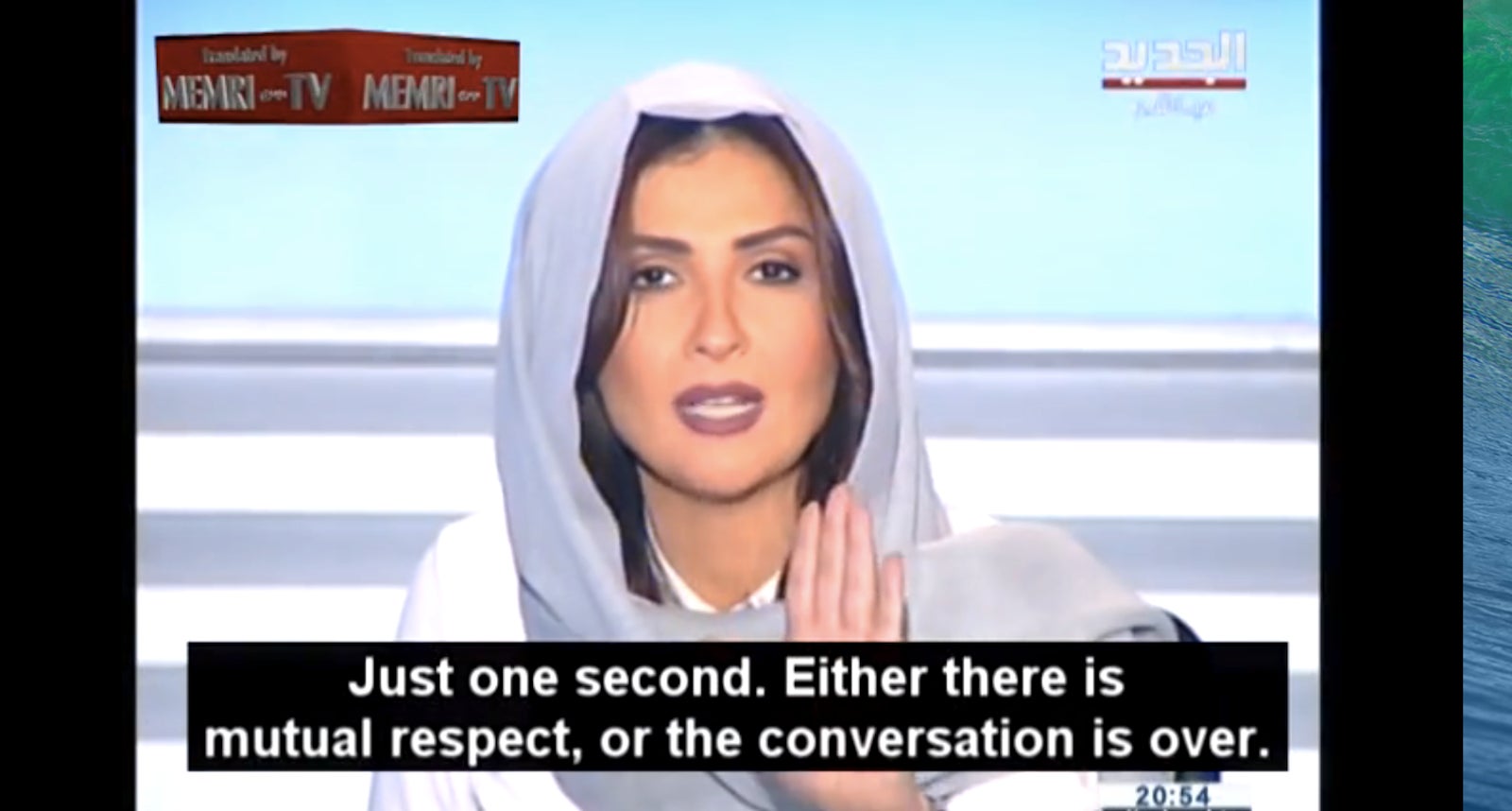Lebanese anchor Rima Karaki is not the first Arab woman to shut up a rude guest
Based on the reaction to a video that has gone viral over the last few days, it appears people are shocked when female Arab presenters are able to shut up rude guests and do their job of moderating discussions.


Based on the reaction to a video that has gone viral over the last few days, it appears people are shocked when female Arab presenters are able to shut up rude guests and do their job of moderating discussions.
But if you were among those surprised, then you need to watch more Arab television. From Morocco to Qatar, female journalists host news shows and interview top political, cultural and religious personalities—and have been doing so for years. Just like their Western counterparts, when necessary these hosts have reminded male guests who is in charge on their show. Like what you see? Learn Arabic, set yourself up with a satellite provider such as Arabsat, Nilesat or Hotbird, and get ready to feign indignation when massive arguments breakout live on air.
Ghada Owais
During the height of Israel’s 50-day war in Gaza last summer, Arabic-speaking Israeli journalist Mounir Cohen was invited onto Al-Jazeera Arabic to discuss the conflict. While there he came up against Lebanese presenter Ghada Owais. As things got slightly heated Cohen made the mistake of telling Owais to “calm down,” patronizing her by saying that being “worked up” is not the way to have a discussion.
Owais proceeds to properly school Cohen when he tells her Hamas is the Islamic State group (IS, formerly ISIS). She pointed out that IS would kill Hamas leader Khaled Meshaal if it got the chance. Basic Islamist ideology, Mr. Cohen.
Reham Saeed
In 2013, Egyptian TV host Reham Saeed was discussing the topic of religiously-sanctioned treatments and their potential abuse by practitioners when her guest, Sheikh Yousef Badri, objected to a question and began angrily objecting to an off-screen producer. “Talk about things that are important to people,” Badri berated Saeed. Bad move. “From the moment you sat down on that chair you have talked down to me… yet you’re taking 1000 Egyptian pounds to come on,” the host replied. “Should a religious preacher ask for 1,000 Egyptian pounds?”
Saeed takes off the scarf she was wearing out of respect, and tells him that she will not wear it for Badri any long. “I’ll wear it for my Lord and not for anyone else,” Saeed says before walking out of the interview.
Amal Arab
In February, a stampede during a match involving the Egyptian clubs Zamalek and ENPPI resulted in the deaths of at least 22 people. The tragedy raised many quetions: Why was tear gas used against fans? Why were there apparently not enough tickets for the fans? Al-Araby’s Algerian presenter, Amal Arab, raised several of these questions during an interview with Zamalek’s club president, Mortada Mansou. Mansour was not happy. “I’m telling you, talk with respect,” Mansour bizarrely shoots back at Arab, who had in fact been quite calm during her questioning.
In a dignified manner, Arab asserts her authority, telling Mansour to “lower his voice” as he is “on a respectable channel.” Mansour rants a bit more but soon decides that it is better to just answer the host’s questions.
Dina Abdel-Rahman
In late 2011, Dina Abdel-Rahman, a presenter on the Egyptian television channel Tahrir, was hosting Fouad Fayoud, a “military analyst.” The topic of discussion was a recent army crackdown on protests in Cairo that had left a number of demonstrators dead. Defending the security forces despite multiple reports that they had fired on peaceful protesters, Fayoud denied seeing any evidence that security personnel used their weapons. Abdel-Rahman then shows him a picture of an officer firing a gun, which Fayoud argued was “a personal weapon.” “A water pistol?” Abdel-Rahman responds sarcastically.
Fayoud continues to swear that no army officer could ever fire on an unarmed Egyptian, even as Abdel-Rahman continues to offer proof they did exactly that. Grasp for answers he finally falls silent, before asking why Abdel-Rahman could not talk about more positive things.